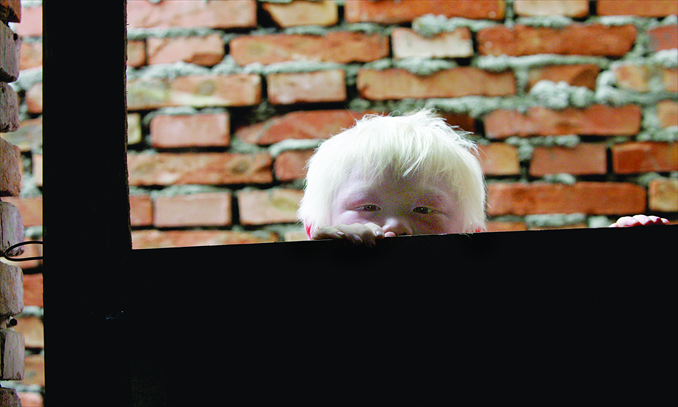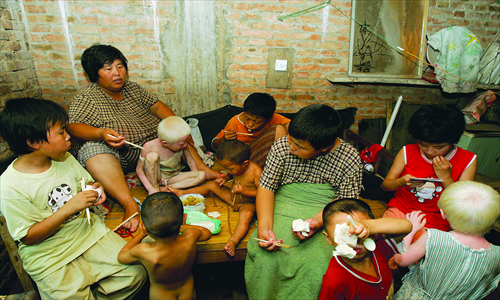Casting the weakest aside

On the morning of January 4, a disastrous fire ripped through a privately run unlicensed orphanage in Lankao, central China's Henan Province.
Seven people, a 20-year-old polio patient and six children under 5 years old, were killed. One child was severely burned and remains in critical condition in hospital.
The fire thrust controversial figure Yuan Lihai, a serial foster mother, into the spotlight. Yuan, who was out sending other adopted children to school when the fire took place, said she "would rather jump into the fire and die for the children."
With Lankao having no official child welfare facilities, Yuan has taken in more than 100 children in the past 26 years, despite lingering doubts as to her capacity to raise them as well as her motives. She mostly took in abandoned children with physical or mental disabilities, homeless children and orphans.

Worrying statistics
China has around 615,000 orphans, government figures show.
Near to one-sixth of them live in government-funded child welfare facilities, leaving the majority to be taken care of by private orphanages.
In the wake of the fire, the safety and situation of the orphans and abandoned children in such homes has become a real concern.
The Ministry of Civil Affairs (MCA) immediately initiated a nationwide inspection into orphanages run by private parties. If these orphanages fail to meet the ministry's standards, the children will be sent to State facilities, the ministry said.
"The central and local governments should shoulder responsibility of taking care of the abandoned children and orphans, and implement a child welfare policy sufficient to provide a lifetime guarantee for them," Wang Zhenyao, dean of the Beijing Normal University One Foundation Philanthropy Research Institute, told the Global Times.
Good Samaritan?
Grief-stricken after the fire, Yuan was taken to hospital on the night of January 5, due to high blood pressure. She remained under sedation throughout January 6.
Around 6 pm, she suddenly woke up and cried out "My babies. Where are my babies?" For the past 26 years, her life had been devoted to the fates of her children.
If not for the fire, it is likely their lives would have remained the same. Yuan and the 18 children then with her would have remained in a run-down but warm two-story house and other properties. One adopted boy wrote in his diary that "I'd rather live in a poor but warm family than in a golden house."
The fatal fire changed everything. Ten kids, who were at school during the fire, were sent to the Welfare House in the city of Kaifeng that administers Lankao on January 5 while Yuan told reporters she would never adopt again.
Yuan Lihai, a mother of two sons and one daughter, adopted her first child in 1987. She opened a fruit stall nearby the local people's hospital, and sometimes moonlighted as a care worker in the hospital. One day, she was paid 20 yuan ($3.2) by a doctor to bury a "dead baby boy" born with a cleft lip.
The abandoned baby suddenly cried out in Yuan's arms, very much alive, and became the first child she adopted.
Yuan carefully took care of it, and she soon garnered fame as a "foster mother" with more and more children being sent to her.
Abandoning unwanted children, especially the disabled and the ill, was once common in Lankao.
"It was catastrophic for a family to have a disabled or severely ill baby. It would cost tens of thousands of yuan to treat the child, and not many families in Lankao could bear that expense," Feng Xiaoyu, a taxi driver, told the Global Times.
Lankao, a poverty-stricken county with a population of 760,000, had no orphanages or welfare houses.
The police and doctors and nurses would also send abandoned children to Yuan, Guo Haiyang, Yuan's son-in-law, told the Global Times. Guo twice witnessed local police officers bringing abandoned children last year.
Under such circumstances, the local civil affairs bureau, where officials were fully aware of Yuan's adoption, silently accepted her help, although she was officially unqualified to adopt since she already had three kids of her own.
According to adoption laws, to adopt a child, parents should meet several criteria, including not having offspring and having the financial situation to raise it.
Yuan's capacity to raise so many kids is in question since running a fruit stall was her main source of income. She would also do odd jobs and receive occasional donations. Du Juan, Yuan's daughter, told Shanghai-based Xinmin Weekly that Yuan had to beg in the streets to collect money to feed the children.
Fiery conditions
An investigation found the fire was ignited by a child playing with a lighter. "I never regretted adopting children. I regret leaving them unattended that day," Yuan said.
Guo says Yuan took on too heavy a burden in taking care of so many babies. At times, Yuan was taking care of as many as 20 children at once.
Reports said the local authority provided a measure of financial assistance to Yuan after she brought along her abandoned children and petitioned the local government several times for help.
In recent years, the government has allocated a basic living allowance of 5,520 yuan a month for Yuan and 18 kids. Daily supplies, including rice, flour, and cooking oil were also sent by the government to her sporadically.
"Considering her economic condition, we have taken measures to help and provide financial assistance for her," Li Meijiao, deputy Party secretary of the civil affairs bureau, told the Global Times.
As conditions worsened, Yuan tried many times to have some of the children moved to the Kaifeng Welfare House from 1993 to 2006 but failed. "The city welfare house rejected orphans coming from outside the city," Feng Junjie, an official from Lankao civil affairs bureau explained.
However, the situation changed in 2007 when the MCA decided to allocate 6 billion yuan to build as many government-run child welfare facilities in big and middle-scale cities, while also improving basic infrastructure and support for existing institutions.
The Kaifeng Welfare House, established in 1928, directly benefited and its capacity to receive children was greatly expanded, allowing it to take some in from outside Kaifeng.
"We tried many times to ask Yuan to send some of the children to Kaifeng Welfare House. But she only did so once, sending 13 kids, and refused to send the rest of the children there," said Li.
Li said that Yuan's care for these children prevented them from taking the children by force and sending them to the welfare house. After the fire, local officials initially accused Yuan of "illegal adoptions" but later admitted to being guilty themselves of lax supervision and management of the children. Six county-level officials, including the director of the civil affairs bureau Yang Peimin, have been suspended.
Worrisome private orphanages
Yuan was not an isolated case. Yang Yunxian, a foster mother in a village of Shanxi Province, has adopted more than 100 children since 1997. She now lives with 34 children, mostly disabled, and has never married.
Yang has been beset with difficulties. Lacking of money, she supports the big family with a meager farming income and sporadic donations. It is impossible for her to get larger, regular donations because she has been labeled as making "illegal adoptions" by the local authority.
Sometimes, Yang has to carry babies and beg on the streets to feed the children, according to media reports.
The future of her adopted children is worrisome. None of the 34 children, mostly handicapped, now living with Yang have a hukou (household registration permit).
But options are running out. Lacking government-run child welfare facilities, a majority of the abandoned children and orphans are left unattended.
According to a child welfare policy report carried out by the MCA in 2012, State facilities are open to orphans and abandoned children in the urban areas, but those in the countryside have to rely on their relatives or on private efforts by people like Yuan and Yang.
The MCA decided to provide a measure of financial aid for such orphans beginning from 2009, with each able to get an allowance of 600 yuan a month. However, research has revealed that more than 100,000 orphans, or 17.8 percent of those in non-government institutions, have never received any aid since the law was passed.
The situation for abandoned children can be much worse. The law states orphans can get an allowance once they show a certificate of death of their parents from the local public security bureau.
For those abandoned children who have no idea who their parents were, it is impossible get such a certificate.
"The government should strengthen supervision and closely cooperate with the private-run orphanages to provide assistance, training, money and staff and ensure a safe and healthy living condition for the children," Wang Zhenyao, told the Global Times.
Wang said it is a solid step for orphans and abandoned children to be taken in by families, rather than staying in the orphanages.
For children's sake, China need to revise its regulations on adoption to lower the overly stringent requirements for adoption, Wang said.
Wang called on the central and local governments to pass child welfare laws to extend China's social welfare umbrella to disabled and sick children so that they "won't be abandoned by their parents."
Lankao authorities said the county's first welfare house would be launched by June but this comes too late for those having perished in the fire.
What people say
"I don't have the heart to leave abandoned children aside," Yuan Lihai said. Yuan's own sons and daughters are estranged from her, because she rarely devoted time to taking care of them. Du Juan, her daughter, said she became jealous of her adopted siblings who she felt her mother lavished attention on. Yuan's husband separated from her more than 10 years ago, opposing her adoption of so many children.
Her 72-year-old mother Zhang Suye, who lives close by, regularly collected trash to support her daughter. Zhang tried many times to tell her daughter to stop adopting, but failed. "She was so stubborn. She said the children would die if she gave up on them," Zhang told the Global Times.
Despite seemingly good intentions, Yuan was under fire from the public. Some of her neighbors said "she was capable of asking for money from the local authorities, going as far as lying on the ground with some of the children in the government building."
Some said she adopted children to profit while others criticized her for asking for money from families who came to adopt some of the children in turn.
The Lankao civil affairs bureau told the press there was no evidence to suggest Yuan profited from adopting the children.